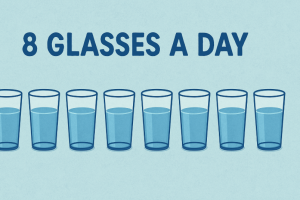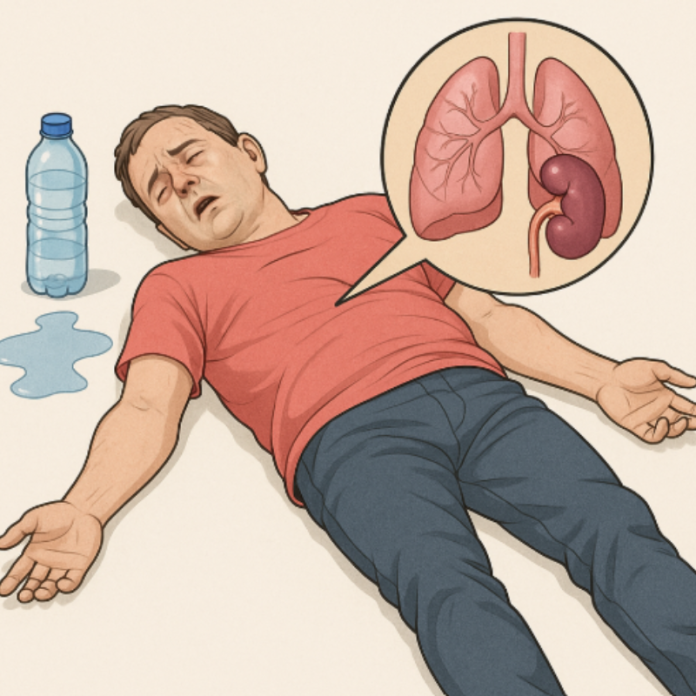You can have too much of a good thing, sometimes even water. Every year many individuals are hospitalized due to water intoxication. Overhydration occurs when the body can’t remove the water that it takes in.

You can suffer from overhydration, or water intoxication, when you drink more water than your kidneys can filter. This results in an electrolyte imbalance in your body. A lot of people believe that drinking more water is always better, but it’s not.
You need to know the dangers of overhydration to stay healthy, though. It’s all about that Goldilocks level of hydration, just right.
Key Takeaways
- Water intoxication is a serious condition that can result from drinking too much water.
- Overhydration occurs when the body’s electrolyte balance is disrupted due to excessive water intake.
- Maintaining a healthy hydration balance is crucial for overall health.
- Understanding the risks of overhydration can help prevent it.
- It’s possible to drink too much water, just as it’s possible to drink too little.
The Hidden Dangers of Drinking Too Much Water
When someone said, ” staying hydrated is important in summer ” you have to give them awareness about overhydration. Overhydration, though less talked about than dehydration, has serious health risks that many don’t know about. Overhydration can cause water intoxication or hyponatremia. Excessive water consumption can lead to water intoxication and hyponatremia. Blood sodium gets too low. It can cause your brain to swell and spell serious trouble.
Why Overhydration Is Often Overlooked?
The body has a complex way to manage fluids. But, drinking too much water during long sports or compulsive drinking can upset this balance.
Common Misconceptions About Hydration
Many think drinking more water is always good. But, this isn’t true. The body needs a balance of water and electrolytes. Drinking too much water without replacing electrolytes can cause an imbalance.
Knowing the dangers of overhydration can help. Here are some possible problems:
| Condition | Cause | Symptoms |
|---|---|---|
| Hyponatremia | Dilution of sodium levels due to excessive water intake | Headache, nausea, vomiting, seizures |
| Water Intoxication | Drinking large amounts of water in a short time | Confusion, muscle weakness, potentially life-threatening |
It’s important to know how much water your body needs to avoid overhydration.
Being careful with your water intake and knowing the signs of overhydration can keep you safe and healthy.
Difference Between Proper Hydration and Overhydration
Drinking enough water is good for us. It helps our body regulate temperature and move nutrients and oxygen around. But, drinking too much water can cause our cells to swell, especially in the brain.
The main difference is how our body handles water. Proper hydration is about balance. Overhydration happens when we drink more than our body can manage.
| Regulation Mechanism | Normal Function | Effect of Overhydration |
|---|---|---|
| Kidney Function | Adjusts urine concentration to maintain electrolyte balance | Overwhelmed, leading to excessive water retention |
| Sodium Levels | Maintains sodium balance through regulation | Dilution of sodium levels, causing hyponatremia |
| Cellular Balance | Maintains proper fluid balance within cells | Cells swell due to excessive water intake |
Common Causes of Overhydration
Many factors can lead to overhydration. Knowing them helps us stay hydrated safely. Overhydration happens when we drink too much water, upsetting our electrolyte balance. It’s key to know these causes to avoid it.
This can cause hyponatremia, a dangerous condition. Athletes need to learn how to hydrate properly to avoid this.
By knowing the common causes of overhydration, we can take steps to prevent it and keep our hydration in balance.
Symptoms of Overhydration
It’s important to know the signs of overhydration to get the right medical help. Overhydration, or water intoxication, happens when we drink too much water. This can upset the balance of electrolytes in our body.
Signs You Shouldn’t Ignore
The first signs of overhydration are often small but very important. They include:
- Nausea or vomiting
- Headache
- Bloating or swelling
- Muscle weakness
- Cramping
These symptoms can look like other health issues. So, it’s key to think about how much water you’re drinking.
Hyponatremia: The Dangerous Side of Overhydration
Drinking too much water can lead to hyponatremia, a serious condition. It happens when your blood’s sodium levels drop too low. This disrupts the balance of electrolytes in your body.
High-Risk Groups for Overhydration
It’s important to know who is at risk for overhydration. Some people are more likely to face problems from drinking too much water. This is because of their health, lifestyle, and age.
- Athletes and Fitness Enthusiasts
Athletes and those who love to stay fit are at a higher risk. They drink a lot of water to stay hydrated, but sometimes they drink too much. This can upset the balance of electrolytes in their bodies, leading to overhydration.
- People with Kidney or Heart Conditions
Those with kidney or heart problems are also at risk. Their bodies can’t handle too much water well. This can cause swelling, shortness of breath, and even heart or kidney damage.
- Individuals Taking Certain Medications
Some medicines can make overhydration more likely. Diuretics might seem odd as a risk, but they can cause problems if not managed right. Other medicines that affect hormones or kidney function also play a role.
- Diuretics and Other Problematic Medications
Diuretics help get rid of extra fluid by making more urine. But, if not watched closely, they can cause dehydration or electrolyte imbalances. It’s important to understand how they affect hydration.
- Vulnerable Age Groups: Elderly and Children
The elderly and children are at risk for overhydration. Older adults might have kidneys that don’t work as well or other health issues. Children, being smaller and still learning to regulate fluids, are also at risk if they drink too much water.

Psychological Conditions That Increase Risk
Some mental health conditions, like psychogenic polydipsia, can lead to drinking too much water. People with this condition can’t stop themselves from drinking water, which can cause overhydration.
Real-Life Case Studies of Overhydration
Overhydration is a serious issue that can lead to hospitalizations and even death. It happens when we drink too much water and our body can’t handle it. This imbalance can cause our brain to swell, which is very dangerous.
- Documented Deaths and Hospitalizations
There have been many cases where drinking too much water has been fatal. For example, Jennifer Strange died in 2007 during a water-drinking contest in Sacramento, California. These cases show how important it is to know the risks of drinking too much water.
- Athletic Events Gone Wrong
Athletes, especially those in long-distance sports, are at risk of overhydration. Cynthia Lucero died in 2002 during the Boston Marathon because she drank too much water. This highlights the dangers of not knowing how much water is safe to drink.
- Military Training Incidents
Even in military training, overhydration can be a problem. In 1997, a Marine recruit died from drinking too much water during training. This incident showed the risks of overhydration in these settings.
- Analysis of What Went Wrong
Looking into these cases, we see a common issue: not knowing how to stay hydrated properly. The table below shows some key points from these incidents.
| Case | Cause | Outcome |
|---|---|---|
| Jennifer Strange | Excessive water intake during contest | Death |
| Cynthia Lucero | Overhydration during marathon | Death |
| Marine Recruits | Excessive water intake during training | Hospitalization/Death |
These examples show we need to learn more about staying hydrated the right way to avoid such tragedies.
How Much Water Should You Actually Drink?
The “8 glasses a day” rule is too simple. It doesn’t take into account your age, sex, weight, or how active you are. Studies have found that this rule isn’t backed by science and might not work for everyone.

Key Factors to Consider
To figure out how much water you need, you should think about a few things:
- Weight and Body Composition
Generally, the more you weigh, the more water you need. Athletes or people with more muscle may need more water because they burn more calories.
- Activity Level and Environment
If you’re active, especially in hot or humid places, you’ll lose more water through sweat. Checking your urine is a good way to see if you’re drinking enough. It should be pale yellow.
- Calculating Your Individual Water Needs
A better way to figure out how much water you need is to use your body weight and activity level. A good rule of thumb is to drink half an ounce of water per pound of body weight.
| Activity Level | Water Intake Recommendation |
|---|---|
| Sedentary | Half an ounce per pound of body weight |
| Moderately Active | Three-quarters of an ounce per pound |
| Very Active | One ounce per pound |
Signs of Appropriate Hydration
It’s important to know when you’re drinking enough water. If your urine is pale yellow and you’re having regular bowel movements, you’re likely hydrated.
Creating a Personalized Hydration Plan
Creating a hydration plan that’s just for you means thinking about your activity, the weather, and how much you sweat. A plan that fits you can help you stay hydrated without overdoing it.
| Activity Level | Hydration Needs | Recommended Fluid Intake |
|---|---|---|
| Low Intensity | Low | Water |
| High Intensity | High | Sports Drink |
| Endurance | High | Water and Electrolytes |
Keeping a hydration balance is key for good health. Overhydration can cause serious problems like hyponatremia. It’s important to follow safe hydration practices that fit your needs.


